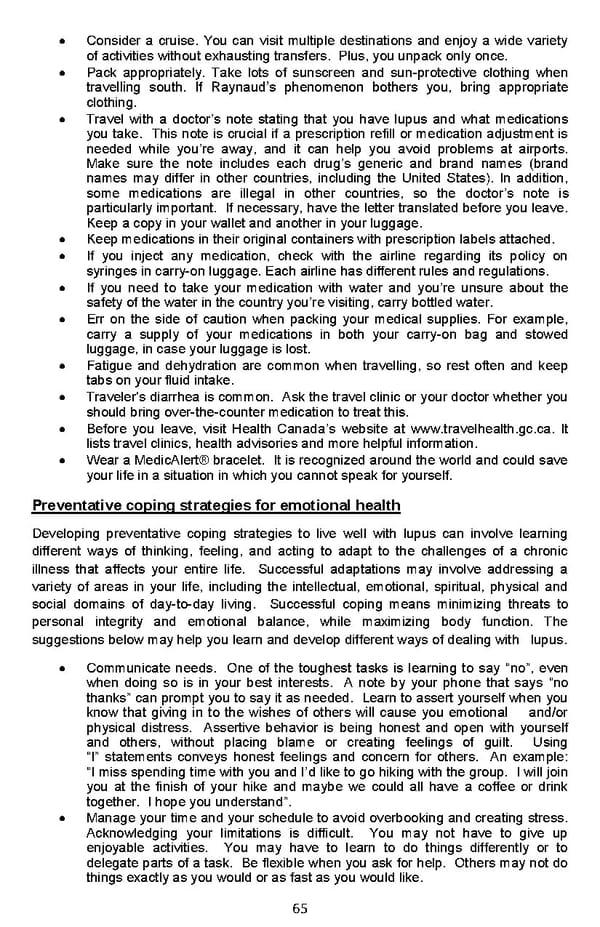• Consider a cruise. You can visit multiple destinations and enjoy a wide variety of activities without exhausting transfers. Plus, you unpack only once. • Pack appropriately. Take lots of sunscreen and sun-protective clothing when travelling south. If Raynaud’s phenomenon bothers you, bring appropriate clothing. • Travel with a doctor’s note stating that you have lupus and what medications you take. This note is crucial if a prescription refill or medication adjustment is needed while you’re away, and it can help you avoid problems at airports. Make sure the note includes each drug’s generic and brand names (brand names may differ in other countries, including the United States). In addition, some medications are illegal in other countries, so the doctor’s note is particularly important. If necessary, have the letter translated before you leave. Keep a copy in your wallet and another in your luggage. • Keep medications in their original containers with prescription labels attached. • If you inject any medication, check with the airline regarding its policy on syringes in carry-on luggage. Each airline has different rules and regulations. • If you need to take your medication with water and you’re unsure about the safety of the water in the country you’re visiting, carry bottled water. • Err on the side of caution when packing your medical supplies. For example, carry a supply of your medications in both your carry-on bag and stowed luggage, in case your luggage is lost. • Fatigue and dehydration are common when travelling, so rest often and keep tabs on your fluid intake. • Traveler's diarrhea is common. Ask the travel clinic or your doctor whether you should bring over-the-counter medication to treat this. • Before you leave, visit Health Canada’s website at www.travelhealth.gc.ca. It lists travel clinics, health advisories and more helpful information. • Wear a MedicAlert® bracelet. It is recognized around the world and could save your life in a situation in which you cannot speak for yourself. Preventative coping strategies for emotional health Developing preventative coping strategies to live well with lupus can involve learning different ways of thinking, feeling, and acting to adapt to the challenges of a chronic illness that affects your entire life. Successful adaptations may involve addressing a variety of areas in your life, including the intellectual, emotional, spiritual, physical and social domains of day-to-day living. Successful coping means minimizing threats to personal integrity and emotional balance, while maximizing body function. The suggestions below may help you learn and develop different ways of dealing with lupus. • Communicate needs. One of the toughest tasks is learning to say “no”, even when doing so is in your best interests. A note by your phone that says “no thanks” can prompt you to say it as needed. Learn to assert yourself when you know that giving in to the wishes of others will cause you emotional and/or physical distress. Assertive behavior is being honest and open with yourself and others, without placing blame or creating feelings of guilt. Using “I” statements conveys honest feelings and concern for others. An example: “I miss spending time with you and I’d like to go hiking with the group. I will join you at the finish of your hike and maybe we could all have a coffee or drink together. I hope you understand”. • Manage your time and your schedule to avoid overbooking and creating stress. Acknowledging your limitations is difficult. You may not have to give up enjoyable activities. You may have to learn to do things differently or to delegate parts of a task. Be flexible when you ask for help. Others may not do things exactly as you would or as fast as you would like. 65
 Living Well With Lupus Facts Booklet Page 64 Page 66
Living Well With Lupus Facts Booklet Page 64 Page 66